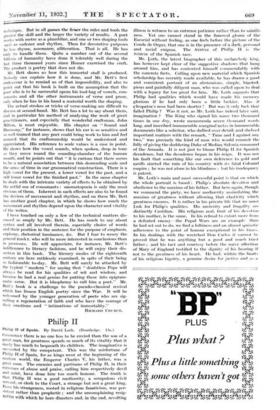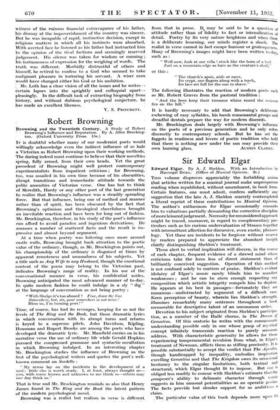Philip II
Philip II of Spain. By David Loth. (Routledge. 15s.)
COMMONLY there is no one less to be envied than the son of a great man, for greatness spends so much of its vitality that it rarely has much to bequeath its children. The imaginative is succeeded by the competent. This was the misfortune of Philip II of Spain, for as kings went at the beginning of the modern world, the Emperor Charles V, his father, was a great man. The enemies and partisans of Philip II, in their extremes of abuse and praise, calling him respectively devil and saint, have done him too much honour. The truth is that Philip II• was a good mediocrity, a scrupulous civil servant, or clerk to the Court, a strange but not a great king. Even his strangeness, rooted in religious fanaticism, was per- sistent rather than prophetic ; and the uncomplaining resig- nation with which he bore disasters and, in the end, revolting illness is witness to an entreme patience rather than to saintli-
ness. Yet one cannot stand in the funereal gloom of the Escorial without feeling, as one feels before the picture of the
Conde de Orgaz, that one is in the presence of a dark, personal and racial enigma. The tristeza of Philip II is the tristeza of the Spanish race.
Mr. 1..;Oth, the latest biographer of this melancholy king, has however kept clear of the suggestive shadows that hang around him, and has contented himself commendably with the concrete facts. Calling upon new material which Spanish scholarship has recently made available, he has drawn a good and consistent portrait of an abstemious, simple, bigoted.
pious and painfully diligent man, who was called upon to deal with a legacy far too great for him. Mr. Loth suggests that.
Philip had qualities which would have made his memory glorious if he had only been a little luckier. Alas—if Cleopatra's nose had been shorter ! But was it only luck that failed Philip ? Was it not, as Mr. Loth has indeed later said.
imagination ? The King who signed his name two thousand times in one day, wrote memoranda seven thousand words
long, and inscribed innumerable marginal notes in innumerable
documents like a solicitor, who dallied over detail, and shelved important matters with the remark, " Time and I against any two," was precisely the kind of man who would commit the folly of giving the doddering Duke of Medina Sidonia command of the Armada. It is not just to blame Philip II for Spanish decadence, but the decadence began in his reign. It was not his fault that something like our own deference to gold and tariffs started the ruin of his country with its fatal Colonial empire ; he was not alone in his blindness ; but his inadequacy is patent.
Mr. Loth's main and most successful point is that on which the whole portrait is based : Philip's absolute devotion and obedience to the maxims of his father. But here again, though we commend the piety, we have mediocrity assimilating the maxims of greatness without allowing that elasticity which greatness ensures. It is rather in his private life that we must. look for Philip's qualities. His austerity and frugality are distinctly Castilian. His religious zeal, fruit of his devotion to his mother, is the same. In his refusal to extort more f a defeated enemy—the Papal Wars are an example - than he had set out to do, we find a loftiness and an almost quixotic adherence to the point of honour exceptional in his times. In his dealings with the wretched Don Carlos it cannot be proved that he was anything but a good and much tried father ; and his tact and courtesy before the naive affection of Mary of England testified to the dignity of his bearing if not to the greatness of his heart. He had, within the limits of his religious bigotry, a genuine desire for justice and as a
witness of the ruinous financial extravagance of his father, his dismay at the impoverishment of the country was sincere. But he was incapable of rapid, instinctive decision, except in religious matters in which all his instincts were absorbed, With averted face he listened as his father had instructed him to the opinion of the rival factions and seemingly reserved judgement. His silence was taken for wisdom or cunning ; his tortuousness of expression for the weighing of words. The truth was different. Morbidly distrustful of others and himself, he retired to confess to a God who seemed to take malignant pleasure in torturing his servant. A wiser man would have changed either his God or his ambition.
Mr. Loth has a clear vision of all the issues and he writes— ;Certain lapses into the sprightly and colloquial apart, pleasingly. In the difficult task of extracting biography from history, and without dubious psychological conjecture, he has made an excellent likeness.
V. S. PRITCHETT.































 Previous page
Previous page